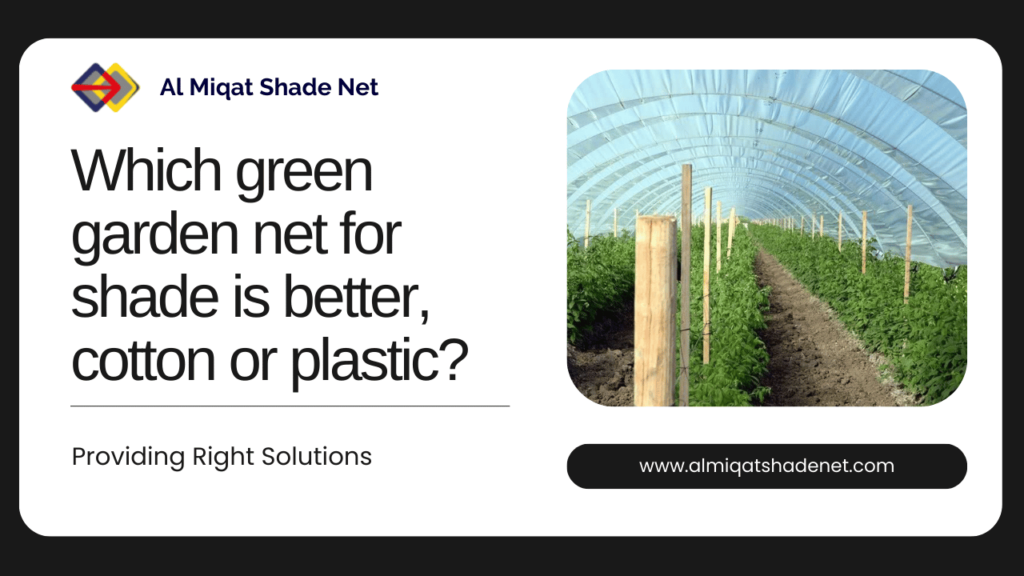In the world of modern gardening and farming, choosing the right shade net is crucial for protecting plants and ensuring optimal growth. With a variety of options available, the decision often comes down to the type of material used. Among the most popular choices are cotton and plastic shade nets. Al Miqat Shade Net, the best shade net provider in the UAE, offers a range of high-quality green shade nets tailored to meet different agricultural needs. Let’s explore the benefits and drawbacks of cotton shade netting and plastic shade net to determine which is the better option for your garden.
Cotton Shade Netting: Natural and Breathable
Cotton shade netting is made from natural fibers, which makes it an attractive choice for environmentally conscious gardeners. This type of green shade net offers several benefits due to its natural properties.
Firstly, cotton is highly breathable, allowing for excellent air circulation around plants. This helps prevent overheating and ensures that plants remain cool and well-ventilated, which is particularly important in hot climates like the UAE. Additionally, cotton shade netting provides a softer and more diffused shade, which can be beneficial for delicate plants that might be damaged by harsher shading materials.
Moreover, cotton shade nets are biodegradable, making them an eco-friendly option. When disposed of, they break down naturally without leaving harmful residues, thus reducing environmental impact. This characteristic aligns well with sustainable farming practices and contributes to a greener planet.
However, there are some downsides to consider. Cotton shade nets are generally less durable than their plastic counterparts. They are more susceptible to wear and tear, especially when exposed to harsh weather conditions such as heavy rains or strong winds. Over time, cotton fibers can degrade, necessitating more frequent replacements and potentially higher long-term costs.
Plastic Shade Net: Durable and Versatile
Plastic shade nets, on the other hand, are made from synthetic materials such as polyethylene. These nets are known for their durability and strength, making them a popular choice for gardeners and farmers seeking long-lasting solutions.
One of the main advantages of plastic shade nets is their durability. They are resistant to wear and tear and can withstand harsh weather conditions, including heavy rains, strong winds, and intense sunlight. This resilience ensures that plastic shade nets have a longer lifespan compared to cotton shade netting, which can translate to cost savings over time.
Additionally, plastic shade nets are available in a variety of types and densities, providing different levels of shading to suit various plants and growing conditions. For example, Al Miqat Hardware offers greenhouse shade nets that are specifically designed to optimize light diffusion and temperature control, making them ideal for greenhouse environments. This versatility allows gardeners to choose the right level of protection for their specific needs.
Plastic shade nets are also easy to clean and maintain. They do not absorb moisture, which reduces the risk of mold and mildew growth. This makes them a practical choice for gardens and farms where cleanliness and hygiene are important.
However, plastic shade nets are not biodegradable and can contribute to environmental pollution if not disposed of properly. While they are recyclable, the recycling process for plastics can be complex and energy-intensive. Gardeners who prioritize sustainability might find this aspect less appealing compared to the natural biodegradability of cotton shade nets.
Comparing Cotton and Plastic Shade Nets
When deciding between cotton and plastic shade nets, it’s important to consider several factors, including durability, environmental impact, and specific gardening needs.
Durability: Plastic shade nets are more durable and weather-resistant, offering a longer lifespan and reducing the need for frequent replacements. Cotton shade nets, while softer and more breathable, may require more frequent replacement due to their susceptibility to wear and tear.
Environmental Impact: Cotton shade nets are biodegradable and align well with eco-friendly practices. They naturally decompose without harming the environment. Plastic shade nets, although durable, are not biodegradable and can contribute to environmental pollution if not managed properly. However, they are recyclable, which can mitigate some environmental concerns.
Application: Plastic shade nets offer greater versatility with a range of types and densities suitable for different plants and growing conditions. They are ideal for environments requiring specific light diffusion and temperature control, such as greenhouses. Cotton shade nets provide a softer, more diffused shade, which can be beneficial for delicate plants and those requiring better air circulation.
Conclusion
Choosing between cotton and plastic shade nets depends on your specific gardening needs and environmental values. Cotton shade nets offer a natural, breathable, and eco-friendly solution, ideal for those prioritizing sustainability and gentle shading. On the other hand, plastic shade nets provide durability, versatility, and long-term cost savings, making them a practical choice for a wide range of applications.
Al Miqat Hardware, the leading shade net provider in the UAE, offers a comprehensive selection of green shade nets, including both cotton and plastic options. By understanding the benefits and drawbacks of each material, you can make an informed decision that best suits your garden’s requirements. Whether you choose the natural appeal of cotton or the robust performance of plastic, the right shade net can significantly enhance your gardening success, ensuring healthy and thriving plants throughout the year.


